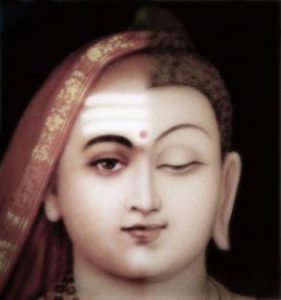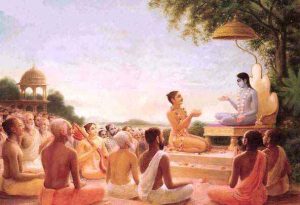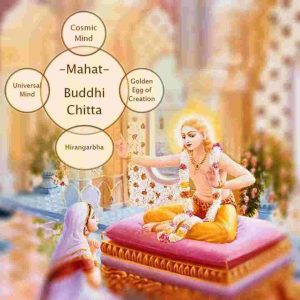An increase in the mode of goodness strengthens religious principles.
“Since the three modes of material nature are constantly in conflict, vying for supremacy, how is it possible that the mode of goodness can subdue the modes of passion and ignorance? Lord Kṛṣṇa here explains how one can be strongly fixed in the mode of goodness, which automatically gives rise to religious principles. In the Fourteenth Chapter of Bhagavad-gītā, Lord Kṛṣṇa elaborately explains the things that are in goodness, passion and ignorance. Thus, by choosing food, attitudes, work, recreation, etc., strictly in the mode of goodness, one will become situated in that mode. The usefulness of sattva-guṇa, or the mode of goodness, is that it produces religious principles aimed at and characterized by devotional service to Lord Kṛṣṇa. Without such devotional service to the Lord, the mode of goodness is considered useless and merely another aspect of material illusion. The word vṛddhāt, or “strengthened, increased,” indicates clearly that one should come to the platform of viśuddha-sattva, or purified goodness. The word vṛddhāt indicates growth, and growth should not be stopped until full maturity is reached. The full maturity of goodness is called viśuddha-sattva, or the transcendental platform on which there is no trace of any other quality. In pure goodness all knowledge automatically manifests, and one can easily understand one’s eternal loving relationship with Lord Kṛṣṇa. That is the actual meaning and purpose of dharma, or religious principles. Religious principles, strengthened by the mode of goodness, destroy the influence of passion and ignorance. When passion and ignorance are overcome, their original cause, irreligion, is quickly vanquished.
One who desires to cultivate the mode of goodness must consider the following points. One should study religious scriptures that teach detachment from mental speculation and material sense gratification, not scriptures that provide rituals and mantras to increase material ignorance. Such materialistic scriptures do not give attention to the Supreme Personality of Godhead and thus are basically atheistic. One should accept pure water for quenching thirst and cleaning the body. There is no need for a devotee to use colognes, perfume, whiskey, beer, etc., which are all polluted manifestations of water. One should associate with persons who are cultivating detachment from the material world and not with those who are materially attached or sinful in their behavior. One should live in a solitary place where devotional service is practiced and discussed among Vaiṣṇavas. One should not be spontaneously attracted to busy highways, shopping centers, sports stadiums, and so on. Concerning time, one should rise by four o’clock in the morning and utilize the auspicious brāhma-muhūrta to advance in Kṛṣṇa consciousness. Similarly, one should avoid the sinful influence of hours such as midnight, when ghosts and demons are encouraged to become active. Concerning work, one should execute one’s prescribed duties, follow the regulative principles of spiritual life and utilize all of one’s energy for pious purposes. Time should not be wasted in frivolous or materialistic activities, of which there are now literally millions in modern society. One can cultivate birth in the mode of goodness by accepting the second birth of initiation from a bona fide spiritual master and learning to chant the Hare Kṛṣṇa mantra. One should not accept initiation or so-called spiritual birth in unauthorized mystical or religious cults in the modes of passion and ignorance. One should meditate upon the Supreme Personality of Godhead as the enjoyer of all sacrifices, and similarly, one should meditate on the lives of great devotees and saintly persons. One should not meditate on lusty women and envious men. Concerning mantras, one should follow the example of Śrī Caitanya Mahāprabhu by chanting the Hare Kṛṣṇa mantra and not other songs, verses, poetry or mantras that glorify the kingdom of illusion. Purificatory rituals should be performed to purify the spirit soul and not to bring down material blessings on one’s material household.
One who increases the mode of goodness will certainly become fixed in religious principles, and automatically knowledge will arise. As knowledge increases one is able to understand the eternal spirit soul and the Supreme Soul, Lord Kṛṣṇa. Thus the soul becomes free from the artificial imposition of the gross and subtle material bodies caused by the modes of material nature. Spiritual knowledge burns to ashes the material designations that cover the living entity, and one’s real, eternal life begins.”
Source: A.C. Bhaktivedanta Swami Prabhupada (2014 edition), “Srimad Bhagavatam”, Eleventh Canto, Chapter 13 – Text 02, 03 & 06.





























